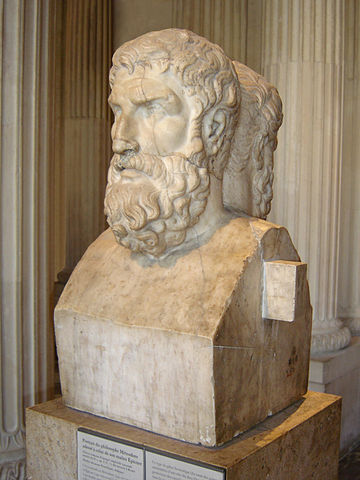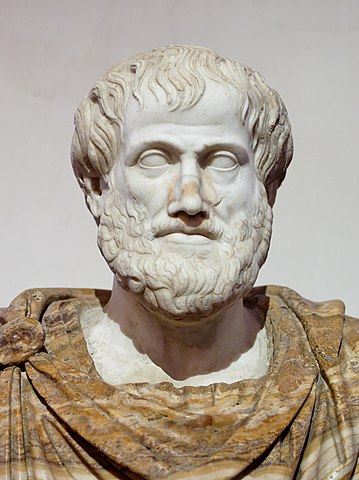 ncient Greece was an intellectual hub that produced some of history’s greatest minds. Politic theory, science, and philosophy were ground into the culture of this extraordinary civilization. And just like the people of today, the Greeks were obsessed with how to live a good life.
ncient Greece was an intellectual hub that produced some of history’s greatest minds. Politic theory, science, and philosophy were ground into the culture of this extraordinary civilization. And just like the people of today, the Greeks were obsessed with how to live a good life.
Whilst some of their ideas haven’t stood the test of time, there’s a reason people still read Greek philosophy. These ancient works are packed with valuable knowledge that can change our lives for the better.
1. Focus on what you can control (Epictetus)
Epictetus isn’t the most well-known Greek philosopher, but he still has plenty of interesting ideas.
He wrote extensively about individual agency. Rather than worrying about things beyond our control, Epictetus believes we should only concern ourselves with our own actions and thoughts.

Death, for instance, is a pointless thing to worry about, for our own mortality is unavoidable. However, we do have control over our perception of death. Those who frett about their lifespan simply need to change their attitude.
Epictetus also applies this concept of personal agency to those who obsess over the opinions of others. If we worry about how we’re perceived, we become a slave to something beyond our control, which is a sure way to lead a miserable life.
True freedom comes from finding happiness in that which fulfills us on an individual level.
2. Let reason guide you (Plato)
Plato covered many topics, but one of his most consistent mantras was that reason is paramount.
He argues that our minds are driven by three things: pleasure, reputation, and reason. Whilst these three driving forces are sometimes in agreement, they are frequently at loggerheads as well.

Plato believes that a disordered mind (or soul) arises when we are not driven by reason. Lying, stealing, mockery, and spitefulness all feed the selfish, unreasonable part of our minds. If this happens too often, our shallow desires and our need for recognition can overpower us:
“This sort of situation, when the elements of the mind are confused and displaced, is what constitutes injustice, indiscipline, cowardice, ignorance and, in short, wickedness of all kinds.”
If, by contrast, we are guided by reason, our minds will be content and healthy.
3. Choose your pleasures wisely (Epicurus)
Whilst Plato’s insistence that reason should guide us is certainly valuable, Epicurus offers some much-needed balance.
Rather than simply avoiding pleasure, Epicurus wants us to be more selective. He argues that the best pleasures are natural and leave us with a sense of satisfaction.

Eating until we are no longer hungry, for instance, is a natural thing to do. However, overeating is unnatural. Rather than feeling contentment, our bodies may suffer pain and our minds will be riddled with guilt. This also conditions us to expect more than we need.
Using this example as a baseline, Epicurus recommends that we avoid overindulgence more generally. An abundance of fame, money, food, and drink will never make us satisfied.
Instead, we should pursue pleasures that leave us with a long-term sense of fulfillment.
4. Make friends with the virtuous (Aristotle)
Like Plato, Aristotle covered many topics in his lifetime, including the importance of friendship. But far from recommending a large number of friends, Aristotle believes that quality is more important than quantity.
Weaker friendships tend to be based on one of two things: utility or pleasure. A business relationship would be an example of the former. Whilst a shared interest in a particular activity or topic would be an example of the latter.
The strongest friendships, meanwhile, are bound by a mutual feeling of goodwill:
“… those who wish well to their friends for their sake are most truly friends … their friendship lasts as long as they are good and goodness is an enduring thing.”

Making friends with the virtuous, therefore, is vital, for virtuous people have a base level of goodness and are more trustworthy. They are unlikely to betray us or encourage wickedness.
Friendships founded on goodwill and virtue typically take longer to form, but they are also the most valuable friendships we can make.
5. Ask questions (Socrates)
No list concerning Greek philosophy would be complete without Socrates. The issue, however, is that there are no sources by Socrates as he wrote very little. Historians call this the ‘Socratic Problem’.
Luckily, we know about this great man due to other philosophers. Xenophon, who was a soldier as well as a philosopher, said the following in relation to Socrates:
“I was never acquainted with anyone who took greater care to find out what each of his companions knew.”
Throughout his many dialogues, Plato’s depiction is similar. Socrates initiates debates and always balances knowledge with inquisitiveness.
Indeed, Socrates was famous for asking questions. He was a man who loved to learn. And given the word ‘philosopher’ literally means ‘lover of wisdom’ in ancient Greek, Socrates is often cited as the godfather of western philosophy.
Acknowledging our own ignorance and asking questions is the first step towards enlightenment. If we all acted like Socrates, the world would be much wiser.


Purchase my history quiz book: https://www.amazon.co.uk/dp/B0BLFWPMKL
Contact: jacobwilliamwilkins@gmail.com





